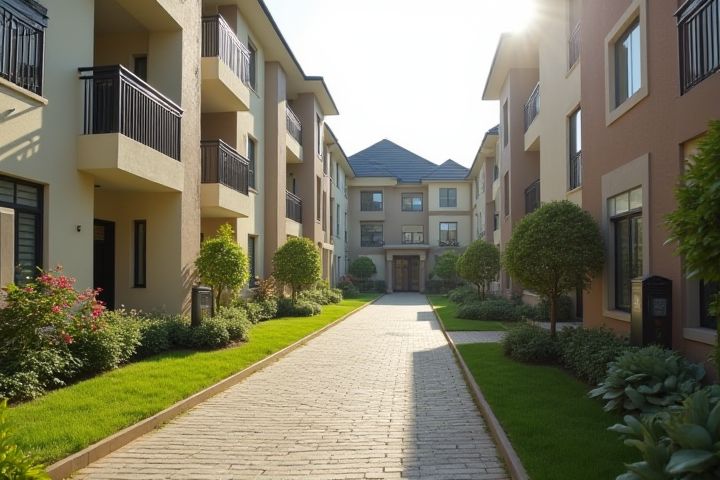
The property market in Nigeria has seen significant growth, driven by increasing urbanization and a rising population. Major cities like Lagos, Abuja, and Port Harcourt are experiencing a surge in real estate development, catering to both residential and commercial needs. With over 200 million people, the demand for housing, office spaces, and retail outlets continues to rise, making investments in this sector particularly attractive. Furthermore, government initiatives aimed at promoting affordable housing have also stimulated interest among both local and foreign investors. If you are considering entering this market, understanding the regulatory framework and market trends is essential for making informed decisions.
Regulatory changes
The Nigerian property market is currently experiencing significant regulatory changes aimed at enhancing transparency and investor confidence. The government has introduced measures to streamline land registration processes, reducing bureaucratic hurdles that previously impeded real estate transactions. New tax regulations are also being implemented to promote affordable housing and stimulate economic growth within the sector. As a potential investor, understanding these changes is crucial for navigating the evolving landscape and maximizing your investment opportunities.
Urbanization trends
The property market in Nigeria is significantly influenced by rapid urbanization trends, with cities like Lagos, Abuja, and Port Harcourt experiencing immense population growth. This influx of residents has spurred a surge in demand for both residential and commercial real estate, driving property prices upward and attracting local and foreign investment. As urban centers expand, the need for adequate infrastructure, including transportation and utilities, becomes increasingly vital to support this growth. Understanding these urbanization dynamics is crucial for investors looking to navigate Nigeria's evolving property landscape effectively.
Infrastructure development
The property market in Nigeria is significantly influenced by ongoing infrastructure development, which enhances accessibility and increases property values. Key projects include road expansions, bridges, and public transportation systems, which create a more favorable environment for residential and commercial investments. Urban areas, particularly Lagos and Abuja, are experiencing a surge in demand for developed properties due to improved infrastructure and connectivity. You can witness firsthand how these enhancements contribute to the overall economic growth and appeal of investing in Nigeria's real estate sector.
Economic fluctuations
The property market in Nigeria is significantly influenced by economic fluctuations, which affect both supply and demand dynamics. Changes in oil prices, GDP growth rates, and foreign investment levels directly impact property values and the overall market stability. Urban areas, such as Lagos and Abuja, often see rapid price changes due to population growth and increased infrastructure development, while rural areas may lag behind. Understanding these economic indicators can help you make informed decisions in the Nigerian real estate sector.
Foreign investment impact
The property market in Nigeria has experienced a notable surge in foreign investment, significantly enhancing urban development and infrastructure. International investors are attracted by the country's emerging economy and abundant natural resources, positioning Nigeria as a key player in West African real estate. This influx of capital not only boosts property values but also creates job opportunities, leading to improved living standards for local communities. Understanding these dynamics can help you navigate the evolving landscape of Nigeria's real estate sector effectively.
Housing deficit
The property market in Nigeria is primarily driven by a significant housing deficit, with an estimated 17 million housing units needed to accommodate the growing population. Urbanization and rapid population growth have intensified the demand for affordable housing solutions, particularly in major cities like Lagos and Abuja. Government initiatives and public-private partnerships are increasingly being implemented to address this housing shortfall through the development of low-cost housing projects. For investors, the Nigerian real estate sector presents lucrative opportunities, particularly in affordable housing development, which holds the potential to meet the urgent needs of the populace.
Mortgage availability
The property market in Nigeria is increasingly influenced by the availability of mortgage options, which plays a crucial role in homeownership accessibility. Financial institutions are expanding their mortgage offerings, with products tailored to various income levels, thereby promoting real estate investment. Furthermore, the government has implemented policies to enhance housing finance, aiming to stimulate economic growth through improved residential infrastructure. As a prospective homeowner, understanding the mortgage landscape can empower you to make informed decisions in navigating the Nigerian real estate market.
Regional market variations
The Nigerian property market exhibits significant regional variations, influenced by factors such as economic growth, infrastructure development, and population density. In cities like Lagos and Abuja, demand for residential and commercial real estate remains robust, driven by urbanization and a burgeoning middle class. Conversely, areas in the North may experience different dynamics, with agricultural land and lower property prices attracting long-term investments. Understanding these regional differences is essential for investors and stakeholders aiming to capitalize on opportunities in Nigeria's diverse real estate landscape.
Technology adoption
The Nigerian property market is increasingly embracing technology to enhance efficiency and transparency in real estate transactions. Platforms for virtual property tours, online listings, and data analytics are revolutionizing how buyers and sellers engage with real estate. Moreover, mobile applications facilitate seamless communication between agents and clients, making property searches more accessible. As technology continues to shape the real estate landscape, investors and homeowners can benefit from improved decision-making and greater market insights.
Land ownership complexities
The property market in Nigeria is characterized by intricate land ownership complexities, significantly influenced by historical land tenure systems and evolving legislative frameworks. Traditional land rights often clash with modern property laws, creating challenges for buyers and investors navigating the market. In urban areas, land disputes can arise from unclear documentation and overlapping claims, which complicate transactions and deter investment. You can mitigate these challenges by conducting thorough due diligence and understanding local regulations before engaging in property acquisition.
